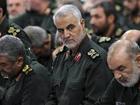Dmitry Medvedev, who has lost his post as prime minister following the government's resignation, served a single term as president before standing aside to allow Vladimir Putin's return to the Kremlin in 2012.
 Full Story
Full Story
Iran on Saturday said its armed forces had "unintentionally" shot down the Ukrainian airliner which crashed outside Tehran.
 Full Story
Full Story
British MPs finally approved the terms of Brexit on Thursday, paving the way for Britain to leave the European Union on January 31 and for trade talks with Brussels to begin.
 Full Story
Full Story
Iran's missile strikes on U.S. troop bases in Iraq were a measured first response to Washington's assassination of a top commander, but are unlikely to be the last act in what could be a long and asymmetrical revenge campaign, experts say.
With an outpouring of emotion in Iran over the killing of General Qasem Soleimani in an American drone strike, Tehran wanted to appear decisive to calm a clamor for revenge, without provoking President Donald Trump to unleash all-out armed conflict.
 Full Story
Full Story
Portraits of Qasem Soleimani have been carried aloft in rallies from Gaza to Yemen, raising the prospect that his violent death will elevate him as an icon of anti-American resistance.
 Full Story
Full Story
Iran's missile attack on two American bases in Iraq in response the the U.S. strike that killed its top general is the culmination of nearly two years of steadily rising tensions since President Donald Trump withdrew from Iran's 2015 nuclear deal with world powers.
 Full Story
Full Story
The U.S. killing of Iranian general Qasem Soleimani was meant to cripple Tehran's clout in the Middle East, but analysts see the allies of the Islamic Republic closing rank instead.
As the head of the Iranian Revolutionary Guards' Quds Force, Soleimani oversaw Tehran's interventions in regional power struggles from Lebanon and Iraq to Syria and Yemen.
 Full Story
Full Story
President Donald Trump campaigns on a no more "stupid" wars mantra, but the U.S. killing of Iran's military mastermind will test his ability to stay out of Middle Eastern quagmires less than a year from election day.
Since the day of his surprise election victory in 2016, Trump has signaled an end to what critics long derided as Washington's global "policeman" role.
 Full Story
Full Story
From mobilizing its allies in the Middle East to blocking shipping in a strategic waterway or even launching a cyber attack far beyond its borders, Iran has no shortage of options to avenge the killing of top commander Qasem Soleimani by its arch foe the United States.
Tehran's clerical leadership promised "severe vengeance... in the right place and time," but is nonetheless expected to carefully weigh the dangers of retaliation to a regime that has been in place since the ousting of the pro-American shah in 1979.
 Full Story
Full Story
The unprecedented American raid that killed top Iranian commander Qasem Soleimani in Baghdad opens a period of uncertainty for the U.S. and their allies in the region.
It also raises questions over what happened, and what happens next.
 Full Story
Full Story



